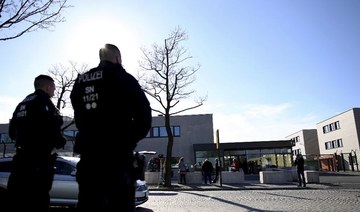BERLIN: Germany has agreed to compensation of about €40 billion ($45 billion) for affected regions, workers and companies as part of plans to end its use of brown coal in power plants by 2038, Economy Minister Peter Altmaier said on Thursday.
The plans are part of measures aimed at cutting greenhouse gas emissions in Europe’s largest economy by 2030 to 55 percent of their 1990 levels. Brown coal, or lignite, is considered the most polluting type of coal, partly because its low heat content means more must be burned.
In a deal reached in overnight talks which stretched into the early morning hours, the government agreed to pay up to €14 billion in aid to the affected states of Brandenburg, North-Rhine Westphalia, Saxony and Saxony-Anhalt until 2038, government spokesman Steffen Seibert said in a statement.
The federal government would take further measures worth up to €26 billion to help brown coal regions up to 2038.
Energy-intensive companies which compete internationally will be eligible for annual subsidies from 2023 to compensate for higher electricity costs caused by the coal exit, Seibert added, without giving details.
Finance Minister Olaf Scholz said during a news conference that utilities shutting down coal-fired plants in the 2020s, in accordance with an agreed coal phase-out plan, would be compensated with a combined sum of €4.35 billion.
Two government sources told Reuters that Berlin plans to pay utility RWE around €2.6 billion in compensation for shutting down coal-fired plants.
Mining company Mibrag, owned by Czech energy group EPH, is likely to get €1.75 billion in compensation, two people familiar with the matter said.
The BDI industry association criticised the agreement, saying companies had hoped for more help to cope with increased energy costs.
Altmaier said the law on exiting coal power would likely be brought before parliament on Jan. 29. It specifies that the last coal-fired plant must be shut by 2038.
“What we have here is a good agreement for climate protection because it makes it clear that we are taking it seriously,” he told reporters.
Armin Laschet, premier of the state of North Rhine-Westphalia, attended the negotiations and told ZDF broadcaster that utility Uniper’s new Datteln 4 coal-fired power plant would be connected to the grid.
Seibert said that Berlin would also pay compensation to employees affected by the coal exit law up to 2043. The exact sum for each worker remains unclear.
The loss of energy caused by the coal exit should be offset by adding natural gas-powered capacity at existing plants, for example at Jaenschwalde in Brandenburg, the spokesman said.
Details about the timetable for decommissioning coal-fired plants and compensation are expected to be made public after talks with utilities.
Germany is the world’s largest producer of brown coal, or lignite, and it fuels about 19 percent of the country’s electricity capacity.
Late last year, the government agreed not to force hard coal power plants to close over the next seven years. The government plans to use a mixture of subsidies and tenders to encourage operators to close the plants beginning this year.
























